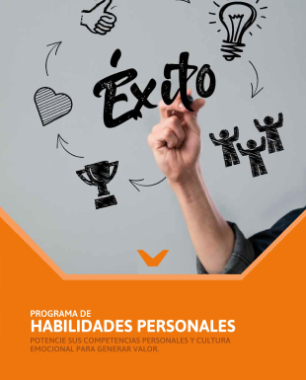In today’s business landscape, sustainability is no longer optional—it’s a strategic imperative. That’s why in this interview, we are pleased to feature two experts in the field of sustainability reporting. Through this interview, we will explore how sustainability reports are making a tangible difference in the way organizations operate and engage with their environment.
Based on its extensive experience in consulting and its commitment to executive education, GĚRENS shares timely and high-impact topics.
We begin with a brief biography of our interviewees, to whom the GĚRENS Graduate School expresses its gratitude for their collaboration:
Annalisa Sentuti
Annalisa Sentuti is an Associate Professor of Business Economics and a researcher at the University of Urbino Carlo Bo (UNIURB) in Italy. She holds a Ph.D. in Business Economics from the University of Macerata, Italy, and a Bachelor’s degree in Economics and Commerce from the University of Urbino Carlo Bo (UNIURB). She teaches Business Economics and Accounting, as well as Sustainability Economics and ESG Reporting. Dr. Sentuti is the author and co-author of over 100 publications and research papers. She has received several awards, including the Best Paper Award from the International Small Business Journal (ISBJ) in 2020, and the Best Doctoral Dissertation Award granted by SIDREA – the Italian Society of Accounting and Business Economics Professors – in 2008.
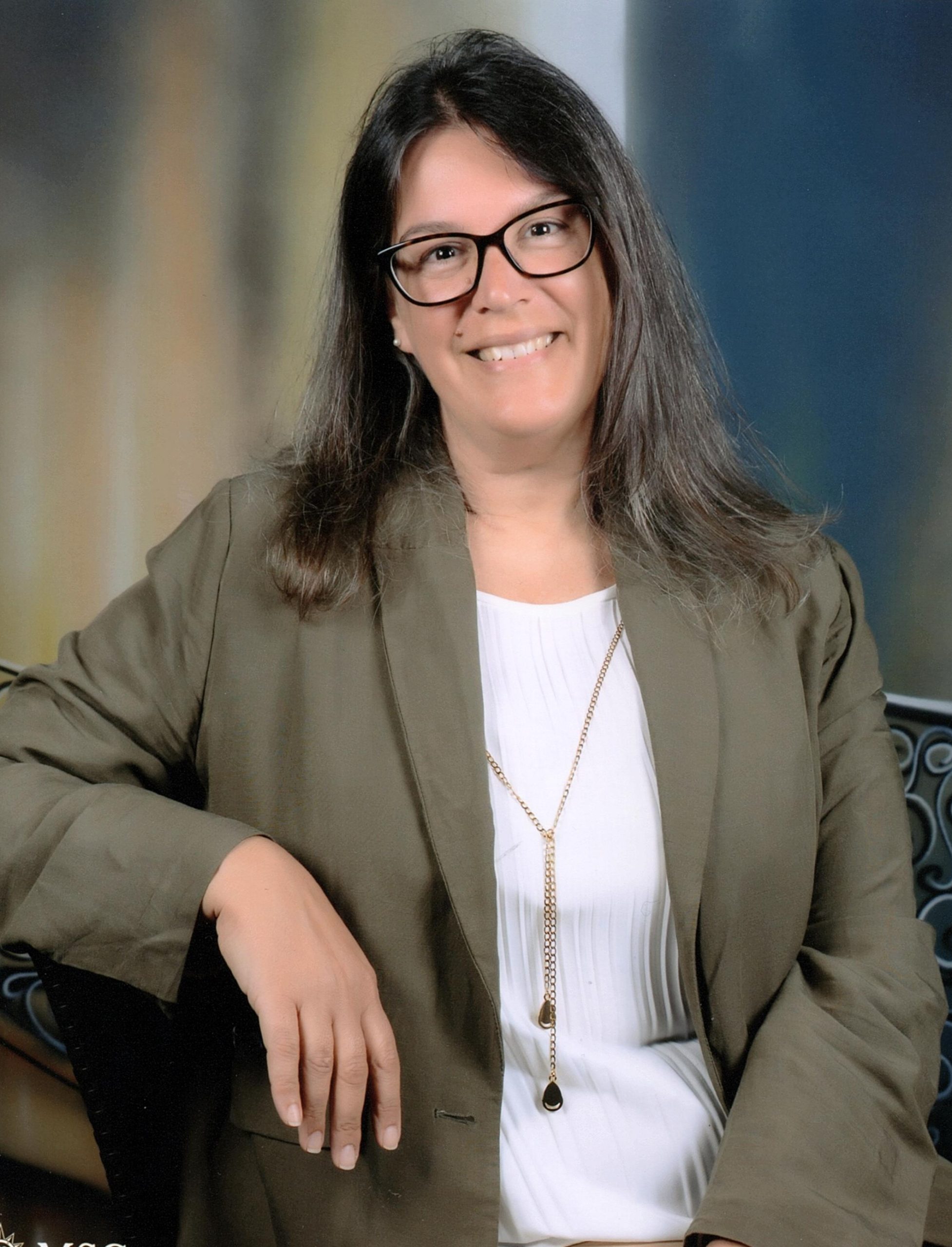 Annalisa Sentuti
Annalisa Sentuti
Ali Díaz
Master’s degree in Economics and Management (Summa Cum Laude) and a Bachelor’s degree in Economics and Management from the University of Urbino Carlo Bo (UNIURB), Italy. She is also an economist from the Pontifical Catholic University of Peru (PUCP). She is a Senior Consultant at GĚRENS. Ali has co-authored two books published by GĚRENS and one by PUCP.
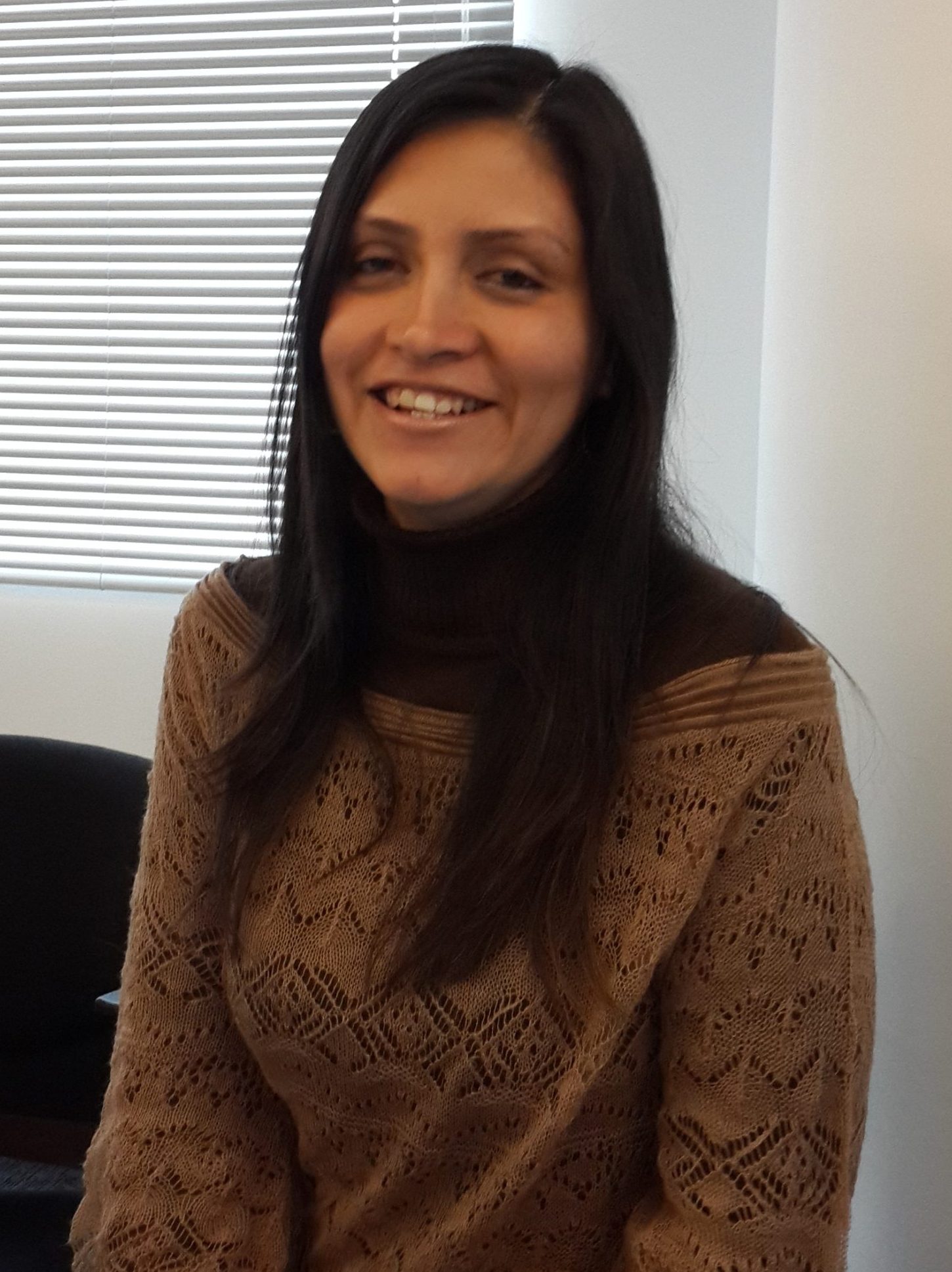 Ali Díaz
Ali Díaz
Introduction to Sustainability:
Ali Díaz, how would you define sustainability in a business context, and why is it so relevant today?
Although the concept of sustainability has received growing attention and the term is widely used, it currently lacks a single, universally accepted definition and is often confused with the term “sustainable development.” The word sustainability first appeared in 1972, and as researcher Fiandrino Simona1 noted in a 2023 publication, the concept of corporate sustainability should not be understood as merely the sum of its environmental, social, and governance (ESG) components. Instead, it should be seen as a balance among these elements, ensuring business continuity. In short, it represents a paradigm shift.
[1]Fiandrino S. (2023). Corporate sustainability from a systemic-relational perspective: Conceptual evolution and analysis of business cases. Giappichelli Editore, Turin.
Prof. Annalisa Sentuti, what are the main challenges companies face when trying to implement sustainable practices?
The main challenges companies face when deciding to implement sustainable practices fall into three areas: economic, regulatory, and cultural.
From an economic perspective, these practices typically require a significant initial investment and do not always guarantee short-term profits. For example, rethinking production processes through a sustainability lens, using resource-efficient techniques (energy, water, and gas), adopting eco-friendly packaging, or selecting raw materials based on ethical and social considerations can be costly—especially for small and medium-sized enterprises (SMEs). However, in the long term, these choices often translate into competitive advantages and reduced operational costs.
At the same time, the regulatory framework must be considered. Sustainability regulations vary from country to country and evolve continuously and rapidly. Companies must choose whether to adopt a reactive approach—merely adapting to existing standards to comply with regulatory obligations and avoid penalties—or a proactive one, positioning themselves to anticipate future legislative changes and, more importantly, to seize new market opportunities.
Last but not least, companies face a crucial cultural challenge: sustainability is not limited to a set of economic choices, such as planning, or a list of regulatory requirements to fulfill—it entails a true shift in mindset. Therefore, it requires the engagement of top management, employees, suppliers, and customers in a transformation process grounded in shared values that promote ethics, transparency, and corporate social responsibility. True sustainability is not simply the adoption of sustainable practices—it involves a deep belief in the value, necessity, and importance of this change. This process may encounter resistance, particularly in traditional sectors or markets where environmental and social awareness is still limited.
Overcoming these challenges requires strategic vision, innovation capacity, and close collaboration between businesses, institutions, and civil society. The future belongs to companies that integrate sustainability into their DNA, transforming these challenges into opportunities for growth.
Integration of Sustainability into Business Strategy:
Prof. Annalisa Sentuti, what are the first steps a company should take to incorporate sustainability into its business model?
It depends. Some companies are born by leveraging strategies that place sustainability at the heart of their business model. For example, companies that develop products from waste generated by other production processes in a circular economy logic, or those operating in the renewable energy sector. These companies are based on the concept of sustainability, and all their steps are oriented toward continuous improvement. However, other companies (which are the vast majority) were created when sustainability was not a central issue, or they operate in traditional sectors or markets where environmental and social awareness is still limited. In this case, it is necessary to begin a process of change and rethink the business model.
The first step is to define a clear and measurable vision of where the company currently stands and then decide where it wants to go and in what timeframe. Sustainability cannot be just an abstract concept; it must be integrated into the company’s strategy: it is crucial to measure it and set concrete goals to be achieved. For this reason, it is important, for example, to ask: What are the economic, environmental, and social impacts of my business? What are the effects of my governance in terms of sustainability? What improvements can I implement in the business model to increase positive impacts and contain or eliminate negative ones in a sustainable development logic?
The next step is to conduct a comprehensive analysis of the business model and the company, starting with processes and products to understand how they impact the environment and society. But it should also consider the practices adopted by the company in the supply chain, in the market, or concerning fiscal matters. This analysis should focus on measuring and evaluating the company’s economic, environmental, and social impacts by identifying what are called material topics, i.e., the issues, areas, and matters related to sustainability that are most relevant to the company.
The third step is to determine how to improve—how to intervene in the business model and the company to prevent and mitigate negative impacts and hold the stakeholders accountable for their actions. Trying to do everything immediately is inconceivable, especially for small and medium-sized enterprises (SMEs). The key question is: Where can we start? Where do we want to begin to innovate/improve our products, processes, and practices with sustainability in mind? For example, from an environmental perspective, from choosing sustainable materials to energy efficiency, through circular economy practices, each sector can find solutions to reduce its negative impact. Innovation is the engine of sustainability, but even small changes can be important to initiate a transformation and remain competitive in the long term.
The fourth step is to involve stakeholders. Sustainable development concerns everyone, and a company’s sustainability journey is a collective one. Working with employees, customers, suppliers, investors, and local communities helps create an ecosystem conducive to change. Recent studies show that sustainable business models tend to expand, going beyond the limits of individual companies and involving other actors, creating real “networked sustainable business models” (Palazzi et al., forthcoming), in which each actor, directly or indirectly, contributes to the company’s sustainability.
Finally, communication and transparency are essential: clearly communicating commitments and progress strengthens trust and corporate reputation. These actions lead us to the final step: reporting to stakeholders about the company’s impacts, the objectives it aims to achieve, and the results it is gradually reaching. This means defining KPIs (Key Performance Indicators) and adopting recognized standards (such as the Global Reporting Initiative – GRI, for example) to measure the company’s impacts and contributions to sustainable development, monitor progress, address critical issues, and trigger a continuous improvement path.
Sustainability reporting, which some companies interpret as the end point of sustainability or the primary goal in terms of sustainability, should instead be understood as a tool that concludes one cycle and lays the foundation for opening another. Reporting is just the tip of the iceberg in a deep, conscious, and systematic approach to sustainability, which cannot depend on isolated initiatives or merely communication activities. Sustainability must become part of the company’s strategy and governance. ESG (Environmental, Social, and Governance) goals must permeate the business model and all corporate practices. In this sense, incorporating sustainability means rethinking the business in terms of long-term value. Companies that are able to adopt this change will not only contribute to a better future but will also strengthen their competitiveness, attract investors, and gain the trust of consumers.
Ali Díaz’s Research
A very important topic we would like to discuss is the research thesis that Magister Ali Díaz recently completed to obtain her master’s degree. She has rejoined GĚRENS as a senior professional and is already working on research and consultancy at our institution.
Ali Díaz, could you tell us what your research was about?
My research analyzed sustainability reporting and two empirical cases: the Social Balance and the sustainability reporting of Benefit Corporations (Società Benefit) that are publicly listed and operate in Italy. The Social Balance is very important because it is the precursor to current sustainability reports.
The goal was to analyze the evolution and diffusion of sustainability reporting over time—its origins, current state, and future outlook.
Ali Díaz, what is the contribution of your thesis to the field of research?
This is a thesis of practical use for any reader, especially for executives, entrepreneurs, and personnel responsible for social responsibility. It is essentially an updated guidebook that not only shows the origins of all the most important topics but also guides the decision-making process towards a sustainable future for the planet and humanity.
Sustainability reporting has become more complex because, over the years, a large number of terms, definitions, standards, models, and standard setters have proliferated. This complexity has led to what journalist Gillian Tett famously called the “alphabet soup” of sustainability reporting standards.
Prof. Annalisa Sentuti, could you comment on the importance of Ali Díaz’s master’s thesis, who, as we know, obtained her master’s degree in Economics and Management with the highest honors, Summa cum laude (110 E LODE in Italian) in September 2024
Firstly, Ali Díaz’s thesis delves into a highly current and relevant topic. Sustainability reporting has increasingly been at the center of the economic, political, and regulatory debate globally in recent years. The new European directives (NFRD and CSRD) impose increasingly strict standards on companies, and the need for transparent communication regarding environmental, social, and governance impacts has become essential. Ali’s research precisely analyzes this evolution, offering a comprehensive view of the past, present, and future perspectives of non-financial reporting.
Secondly, the thesis combines the theoretical analysis of the topics addressed with an empirical study of a sample of publicly listed Benefit Corporations, offering an overview of how these companies approach the relevant regulatory framework and how they truly adopt and implement sustainability reporting. The results revealed interesting points for reflection, providing practical guidance to entrepreneurs, executives, and sustainability professionals. The research can serve as a guide for those who want to improve their sustainability reporting practices and understand the strategic value of sustainability in business.
Another interesting aspect of Ali Díaz’s thesis is the analysis of the educational offering, in the Italian context, of university courses on sustainability reporting. The results highlight a significant gap in university education, as the courses are still very few. Addressing this gap could foster greater awareness and preparedness among future generations of professionals and decision-makers in business.
In summary, we can consider Ali Díaz’s thesis as a bridge between personal experience and scientific research, combining the interest sparked during her studies with rigorous, up-to-date, and effective empirical analysis. It is an interesting work that not only delves into a central topic for the future of companies and society but also serves as a guiding tool and support for those wishing to integrate sustainability into their business model.
Prof. Annalisa Sentuti, could you explain what “110 E LODE” (Summa cum laude) means in the context of the Italian university system?
In the Italian university system, «110 E LODE» is the highest grade a student can receive upon completing their degree. Specifically, 110 represents the highest possible grade (the minimum is 66), and it can only be achieved with an excellent average grade across exams and a very good thesis. The «LODE» (honors) is awarded when the committee, before which the candidate defends their thesis, deems the research excellent, demonstrating a deep understanding of the topic, excellent analytical skills, and a high level of critical and proactive thinking.
Therefore, obtaining «110 E LODE» is a recognition of a brilliant academic career, merit, and the student’s consistent dedication during their courses and in the preparation of their thesis, undoubtedly reflecting a level of preparation superior to the average.
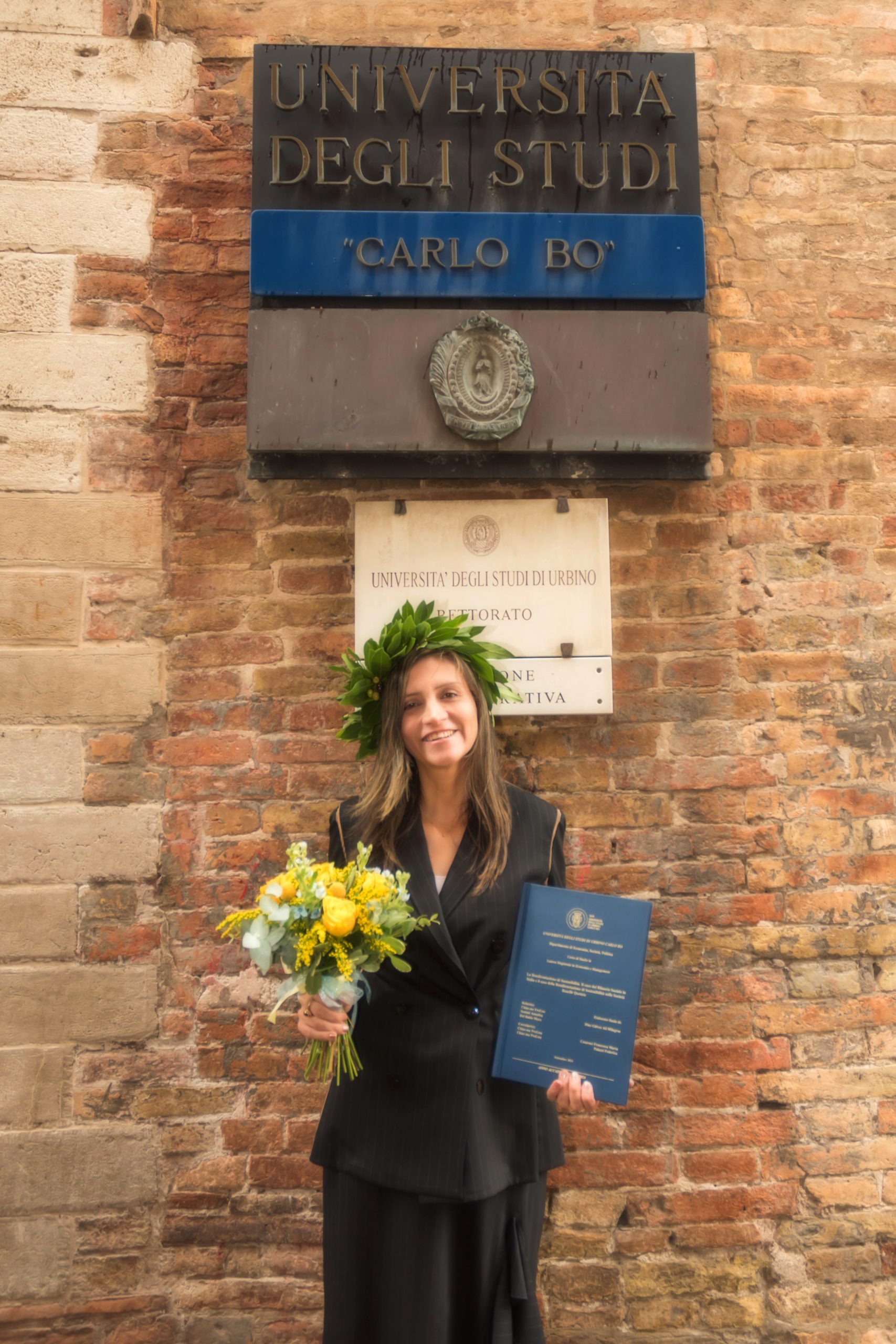 Ali Díaz on the day of her master’s graduation (Urbino – Italia, 20.09.2024)
Ali Díaz on the day of her master’s graduation (Urbino – Italia, 20.09.2024)
Sustainability Reporting Roundtable
In November 2024, GĚRENS organized an interesting roundtable discussion on sustainability reporting, where Magister Ali Díaz presented some results from her research and was joined by an important panel of experts, including Dr. Ana Rosa Adaniya from GĚRENS, Mrs. Andrea Duclos from MMG Las Bambas, and Mr. Jorge Melo Vega and Ms. Cecilia Benavides from the consulting firm Responde.
Ali Díaz, could you tell us what the most important topics discussed during the roundtable were?
The roundtable focused on current trends in sustainability reporting in Europe, Italy, and Peru. Specifically, the following points were addressed:
- The shift from non-financial reporting to sustainability reporting in Europe.
- Sustainability reporting in Italy.
- Challenges and opportunities in harmonizing and standardizing sustainability reports.
- Sustainability reporting in the Peruvian case – new trends.
Roundtable: “Current Trends in Sustainability Reporting in Europe, Italy, and Peru”
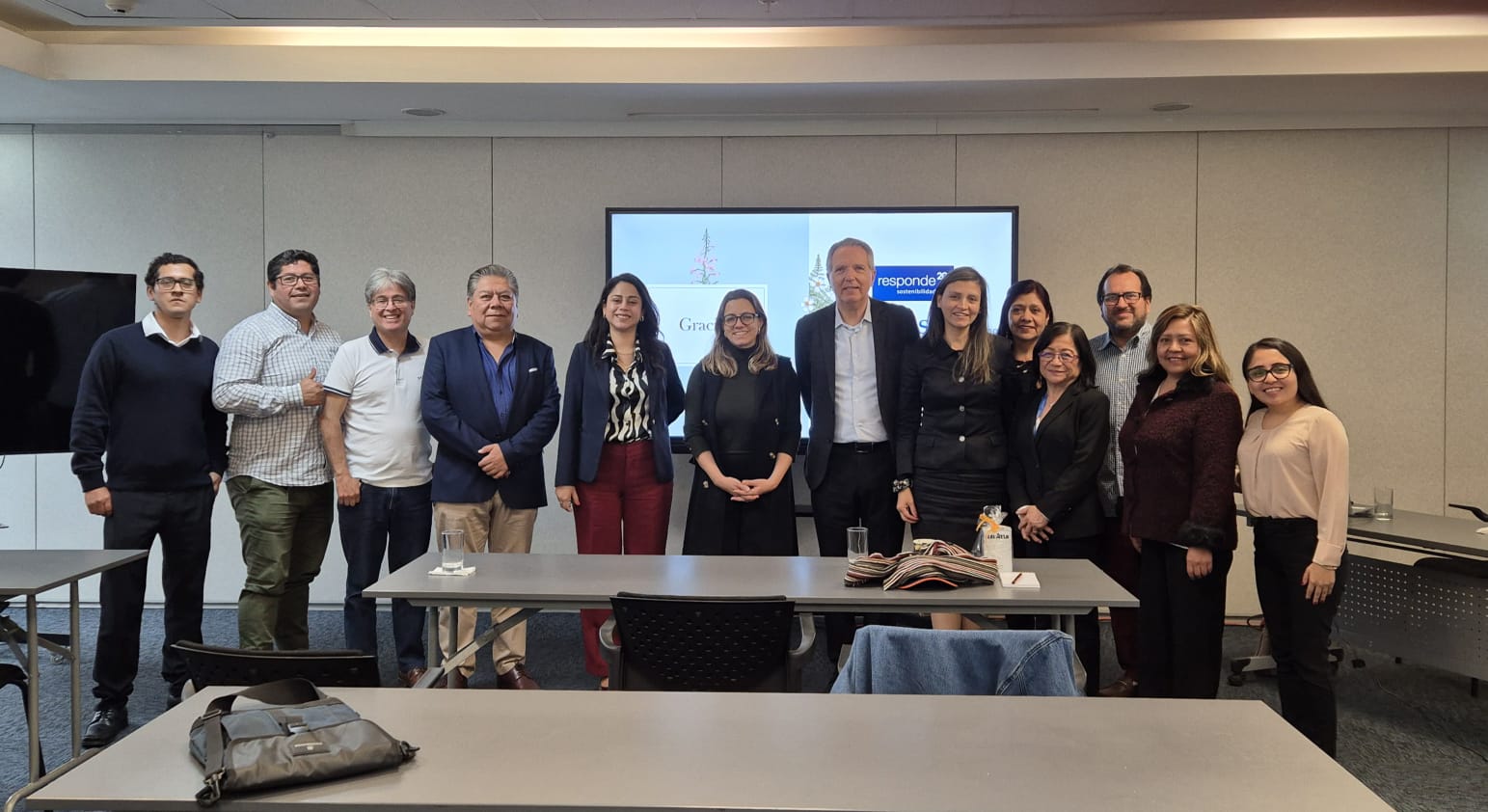 GĚRENS, Lima, Peru (20.11.2024)
GĚRENS, Lima, Peru (20.11.2024)
Let’s continue the conversation on sustainability.
Norms and Standards:
Ali Díaz, what international standards or regulations currently exist in Europe to guide companies on their path toward sustainability?
Regarding international standards, the International Trade Centre, in 2019, identified 255 standards related to the preparation and dissemination of reports on non-financial information and ESG practices. While this proliferation of international standards is a positive sign of the growing interest in sustainability reporting, too many standards can create confusion and prevent comparability between sustainability reports.
In light of this issue and other critical matters, the European Union faces the challenge of harmonizing sustainability reporting by expanding the base of public-interest companies required to prepare and publish them. To address this, the EU issued a regulation in 2022: the Corporate Sustainability Reporting Directive (CSRD), aimed at increasing the quality and quantity of sustainability information. Under this regulation, the European Commission becomes the major issuer of standards for preparing and publishing sustainability reports. Historically, the establishment of such standards has been developed and driven by private institutions.
Innovation and Technology:
Ali Díaz, what role does technological innovation play in improving corporate sustainability?
Technological innovation plays a very important role in enhancing corporate sustainability. In the European Union, for example, the implementation of the new CSRD directive will require companies to use digital, machine-readable reporting formats to improve the accessibility, comparability, and usability of sustainability data. This will demand specific training and that companies are equipped with the appropriate tools (such as software). The challenge will be to leverage new technologies and artificial intelligence (AI) to better prepare and communicate sustainability reports.
Consumers and Sustainability:
Prof. Annalisa Sentuti, what expectations do consumers have today regarding corporate sustainability?
It’s important to make some distinctions, as various factors influence consumer expectations. Elements such as age, education level, disposable income, socioeconomic context, culture, values, and access to information play a key role in shaping consumer perceptions, priorities, expectations, and thus their choices.
Taking this into account and attempting to identify a broader trend, we can say that consumers today are increasingly aware of and attentive to companies’ sustainability practices, and their expectations in this regard are growing. For many, sustainability has become a real criterion when choosing products and services: attention is paid, for example, to the raw materials used, packaging, short supply chains, recyclability or reusability, and the company’s reputation.
More conscious consumers are no longer satisfied with vague “green” slogans—they seek detailed information, verifiable data, recognized certifications, and reward companies that are transparent, offer low-impact products and services, are socially committed, ensure ethical working conditions, respect human rights throughout the value chain, and support local communities.
However, alongside this heightened awareness, some consumer behaviors still show little regard for sustainability. Consider the fast fashion market or online marketplaces that focus on ultra-low prices, impulsive purchases, and disposable products. These realities have devastating impacts in terms of sustainability due to enormous waste production, questionable working conditions, and pollution.
This doesn’t necessarily mean that customers of fast fashion or online marketplaces are against sustainability—it simply means they don’t consider it a priority in their purchasing decisions. Often, they are influenced by factors such as lack of awareness, financial constraints, consumption habits, or disinterest.
It’s a complex issue that still requires much work: on one hand, educating and raising awareness among consumers; on the other, regulating these sectors and forcing companies to act more responsibly. Sustainability is an element we can no longer ignore—most consumers are well aware of this, and their expectations will continue to grow stronger.
Prof. Annalisa Sentuti, how can companies meet these expectations without compromising their economic viability?
It is essential to adopt a medium- to long-term perspective and address the issue both systemically—by considering the company as a whole—and systematically—by proceeding with order, method, and planning. Sustainability involves short- and medium-term costs, but it should be viewed as a long-term strategic investment, essential for maintaining, consolidating, or enhancing competitive advantage.
Companies can pursue this goal in various ways: by innovating their business models and optimizing supply chain management (also through new technologies); targeting market segments where consumers are willing to assign economic value to sustainable products; adopting circular economy principles, promoting reuse and recycling; improving production efficiency, reducing waste, and optimizing resource use; leveraging subsidized financing opportunities and other forms of green incentives; and communicating their sustainability commitments in a transparent and verifiable way—thus avoiding reputational crises linked to unethical or unsustainable practices.
All these strategies not only allow a company to optimize costs, improve customer loyalty, and access new market opportunities, but also strengthen its ability to attract investment. In this way, companies can respond to growing consumer expectations regarding sustainability.
Opportunities:
Ali Díaz, what growth opportunities do you see for companies that invest in sustainability, especially in emerging markets?
Companies that invest in sustainability represent a new paradigm to follow—one that is here to stay and grow—due to its positive impact on the planet, on humanity, and also in economic terms, as predicted by Nobel Prize winner Robert Shiller, who states that in the future, this type of company will achieve better results than others.
Impact and Benefits of Sustainability:
Ali Díaz, how do sustainability consulting services contribute to a company’s image or profitability?
Sustainability consulting services have a positive impact on both a company’s image and profitability. There are, for example, consulting firms specialized in sustainability that support companies in the preparation and publication of sustainability reports.
In terms of image, there is always a risk that a company may publish sustainability reports claiming to carry out sustainable actions simply to enhance its image and reputation—when in fact this is not the case. In response to this lack of transparency, external verification of non-financial information becomes extremely important— for instance, through the publication of audited sustainability reports that ensure the reliability of the information.
Future of Corporate Sustainability:
Prof. Annalisa Sentuti, what is your vision for the future of sustainability in the business world?
I will answer with more questions: what future can we imagine for the business world—and for the entire planet—without sustainability? Can we still afford a linear economic model based on unchecked consumerism, intensive exploitation of non-renewable fossil fuels, and a continuous, indiscriminate increase in waste? Is it still acceptable to produce and consume without considering environmental and social impacts, while ignoring worker exploitation and ecosystem degradation? Is that really the future we want?
My vision—and my hope—is that sustainability will cease to be just a slogan and increasingly become a set of concrete, ethical, and responsible practices. Companies have both the power and the duty to lead this change by integrating sustainability into their business models in an authentic and strategic way.
In my academic role, I work every day to raise awareness, inform, and educate new generations so they are equipped to build a future in which economic success goes hand in hand with respect for the environment and for people.
In summary, based on the insights of Professor Annalisa Sentuti and Ali Díaz, we conclude that corporate sustainability has become a fundamental priority in a global context that demands greater social and environmental responsibility. As we have seen, it is not just about complying with regulations or adopting sustainable practices superficially, but about achieving a balance that ensures long-term business continuity.
Despite the economic, regulatory, and cultural challenges organizations face, sustainability represents an opportunity to innovate, improve competitiveness, and build more responsible relationships with society and the environment. In this regard, the real challenge is not only implementing changes, but transforming the business mindset—adopting a proactive and shared approach that becomes the driving force behind a more balanced and sustainable future.
The companies that succeed in embedding these principles into their DNA will be the ones that thrive—not only in financial terms, but also in their ability to contribute positively to a more just and balanced world.
Presentation of the research:
«Sustainability Reporting: The Case of the Social Report in Italy and the Case of Sustainability Reporting by Benefit Corporations Listed on the Stock Exchange» Urbino – Italia, 20.09.2024
Urbino – Italia, 20.09.2024
Interview by: Karen La Rosa Lora
The GĚRENS Graduate School expresses its special thanks to Cristian Casalboni for his support in the translation from Spanish to Italian.
To read this article in Italian, click here
To read this article in Spanish, click here

